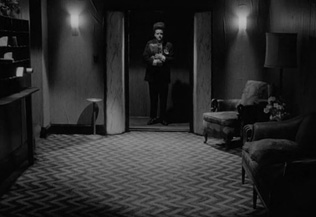Viking Night: Eraserhead
By Bruce Hall
March 29, 2011
In this film, dialogue tends to be secondary to the weight of emotion and the force of ideas, each represented by raw, often repulsive imagery. Shadow is as important as light, but when you do see light it’s usually directing your attention to something. Sound is as important as music but when you do hear music its purpose is to contribute to the film’s haunting, dreamlike narrative. Simply put, Eraserhead is an incredibly disturbing yet fascinating look into one man’s paranoia as he comes to terms with intimacy and fatherhood. On paper that looks simple, but the subject matter deals with the sort of primal emotional states everyone feels but nobody likes to talk about. In Western cinema, using surrealism as a tool to explore these kinds of things fell out of favor shortly after the Great Depression, and that’s probably why it’s so jarring when you see it today.
The focus of Eraserhead is Henry Spencer (Jack Nance), a meek, socially awkward man who drags his feet and speaks with an indistinct mumble. We first meet him as he stumbles down the street, on the way home with a bag of groceries. As he shuffles along through a series of decrepit, abandoned factories and storefronts, the film’s bleak urban setting quickly establishes itself as the primary backdrop. And with his rumpled black suit and sky high haircut, Henry himself comes across as a tragic combination of Cosmo Kramer and Elwood Blues.
If his unfortunate appearance and the decaying post industrial wasteland around him weren’t depressing enough, Henry lives in a decomposing tenement that looks like something out of an H.R. Geiger painting. There, he is roommates with a constantly hissing radiator, a brick wall for a view and a battered array of mismatched furniture that would have been out of date in 1940. There are clumps of earth and grass cuttings all over the place and his nightstand is adorned with a dead tree, haphazardly hunched over a miserable looking pile of dry soil.
Henry is a paranoid, vaguely unpleasant man whose very existence seems to be an, endless parade of hypnagogic despondency. And because this misery is so organically woven into the movie the viewer can’t help but share it. Lynch’s most notable films excel at this process, filling you with a creeping sense of dread but somehow leaving you unable to look away. You don’t watch these movies so much as they just force their way into your head, like a blood curdling bad dream. Lynch also has an unparalleled eye for framing a shot in a way that looks simple at first, but if you pause to look closely the image conveys worlds of meaning. I can think offhand of six or seven still shots from this movie that are suitable for framing, no doubt to be displayed in the darkest nether regions of Stephen King’s most vivid nightmares.
Miserable or not, Henry’s life is at least predictable, until an old flame named Mary (Charlotte Stewart) calls up to invite him to dinner with her family. Thinking she’s interested in reconciliation, Henry accepts. Once introduced to Mary’s bizarre relatives, Henry is informed that his former love has given birth to his child, and that he is expected to marry her and provide for his new family. Henry seems more unable than unwilling to resist, as the whole situation seems to overwhelm him.
Continued:
1
2
3
|
|
|
|




